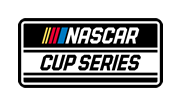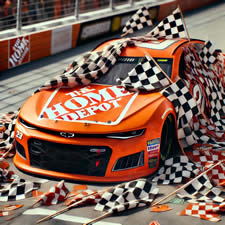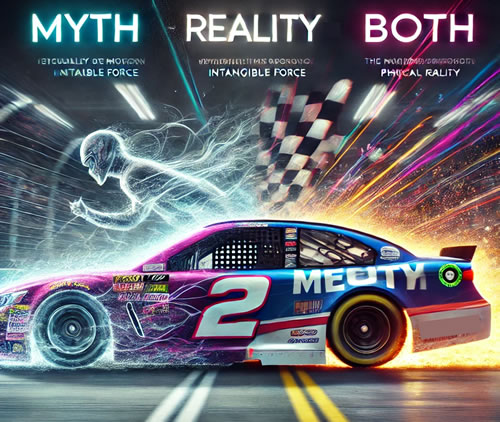
NASCAR Driver Momentum & Performance Trends
Staying updated on NASCAR driver momentum is crucial for fantasy players and bettors. My Driver Momentum tool provides recent finishes and performance trends, helping you identify drivers on the rise or decline. Utilize this data to refine your strategies and gain a competitive edge in your NASCAR endeavors.
Momentum in NASCAR: Myth or Reality?
Momentum is a buzzword that's everywhere in sports culture. We hear it when teams are on a hot streak or when an unexpected slump happens. But what does momentum actually mean in NASCAR? Is it a genuine force that affects driver performance, or is it just a nice story for fans, media, and even drivers themselves? Let's dig into how momentum is perceived, how it might impact races, and if it's something DFS players and bettors should really rely on.
What Exactly is Momentum? Physics vs. Perception

In physics, momentum is clear-cut: it's mass times velocity - simple and measurable. But in sports, it's way more abstract. Momentum describes a change in fortunes, like a driver who suddenly strings together several top-5 finishes. It's tempting to think this run of success predicts more wins down the road.
The question is: is momentum actually real in NASCAR, or just a convenient story we tell? It's often more perception than reality. It helps explain the unexplainable - like a driver's sudden comeback or a shocking series of bad results. In a way, momentum is about making sense of the unpredictable, adding a layer of drama to the sport.
Momentum in NASCAR: During a Race and Throughout the Season
In NASCAR, momentum is used in two main ways: during a race and across multiple weeks of the season.
- In-Race Momentum: Imagine a driver nails a qualifying lap, aces a pit stop, or overtakes a top competitor. These moments can lead to a confidence boost, which often translates into more aggressive and successful passing during that race. But is this really momentum, or just the natural flow of events? The link between a successful moment and continued success is debatable - sometimes it's just coincidence, but it definitely feels like momentum at work.
- Week-to-Week Momentum: Over the season, momentum is the term for when a driver seems to be on a roll - let's say a team that was mid-pack suddenly starts putting up top-10 finishes consistently. This success can give the team a confidence boost, which might lead to even better results. But again, it's worth asking: does momentum drive these performances, or is it just the way we explain them after they happen?
Confidence and Performance: The Role of Momentum

One of the main reasons we buy into momentum is because it influences confidence. There's no denying that success breeds confidence, and confidence can, in turn, boost performance. Drivers on a streak often make quicker decisions, avoid mistakes, and capitalize on opportunities.
Take Tony Stewart as an example. In 2003, Stewart struggled with an average finish of 17.6 through the first 27 races. But in the final nine races, he averaged a finish of 5.5, including multiple podium finishes. Similarly, in 2005, after a slow start, he went on a tear during the summer, averaging 4th place over a 13-race span. This type of performance is often cited as classic momentum in action - where initial success feeds into confidence, leading to more wins.
However, momentum - and the confidence that comes with it - can be fragile. A crash, a mechanical issue, or a poor decision can break the flow instantly. That's why critics argue momentum is largely a story of perception rather than a predictive reality.
Momentum: A Placebo or a Powerful Tool?

Critics often compare momentum to a placebo effect. Just like a sugar pill can lead to real changes because someone believes in it, momentum can influence performance if drivers think they've 'got it.' But if you look at hard data,momentum doesn't necessarily predict future outcomes. In fact, relying too much on momentum can lead to overconfidence, which might end up hurting a driver or team's performance.
Is Momentum Useful for DFS and Betting?
So, should you consider momentum when playing NASCAR DFS or making bets? It really depends on how you use it. If you see momentum as a story that explains past results, it's not going to help much with predicting the future. On the other hand, if you consider how momentum affects confidence - like making a driver more aggressive - it could have some short-term value.
Take a driver who's had a few top-10 finishes in a row. They might feel more confident and take bigger risks, which could lead to a strong result. But this is also where things get fuzzy between momentum and current form. Momentum might suggest continued success, but current form is backed up by the actual data.
For DFS and betting, relying only on momentum is risky. It's a subjective factor, full of interpretation and bias. A smarter approach is to mix current form with other solid metrics - things like average finish, speed rankings, pit stop efficiency, and qualifying results. This way, momentum is just one part of the puzzle, not the entire game plan.
Conclusion: Is Momentum a Myth, a Reality, or a Bit of Both?
Momentum in NASCAR is complex. It may not be something you can measure directly, but its impact on confidence and psychology can't be ignored completely. For fans, momentum adds a lot of excitement to the sport - it turns ordinary results into compelling stories. For drivers and teams, it can be motivating, even if it's mostly perception. And for DFS players and bettors, momentum might offer some clues, but it's definitely not something to depend on alone.
In the end, momentum in NASCAR might be best understood as part myth and part reality. It's a narrative we use to explain the unpredictable nature of racing. While it might not be a reliable metric, it certainly influences how we view the competition - and sometimes even how the competitors perform.
0-race Driver Current Form
0-race Driver In-race Average Positions
You can toggle each of the metrics 'Start', 'Midrace', 'Closer', 'Finish' and 'Running Position' that are displayed in the graph.